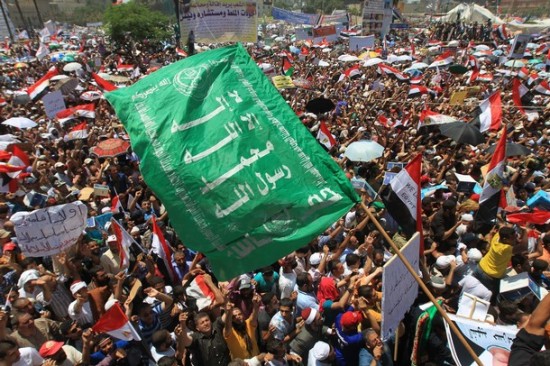The Caliphate and Hizb ut-Tahrir
The most explicit proponents of the Caliphate upon the orthodox theory mentioned thus far has historically been Hizb ut-Tahrir, an international Islamic political party that was established in Jordan in 1953 and is now operating across several countries in the Muslim World, from Indonesia to Uzbekistan to Tunisia. The group is currently in the media as being under pressure in Pakistan by the regime there, which views the ideas of the movement as a threat, especially as their anti-government discourse highlighting the role of Pakistan in America’s deeply unpopular actions in the region, from predator drones to other forms of illegal and illegitimate actions, resonates with the general public as well as government and military figures. Their detractors would consider them to be the most “anti-democratic”, and their vision of the Caliphate the most “dictatorial”, and so it is useful to briefly consider their understanding of the role of the Caliph and his relationship with his subjects.
In line with the classical position, they consider the Caliphate to be a contract of “consent and choice”. The choice of the people is to be found through a process of nomination and election carried out by a directly elected council named the majlis al-ummah (the Ummah council) in a manner that appears to be largely inspired by the practice that occurred at the time of the nomination and selection of the third Caliph Uthman bin Affan.
Regarding the contractual basis between the Caliph and the people, in the book “The Ruling System”, their second leader Abdul Qadeem az-Zalloom writes that unlike the monarchies of Saudi Arabia and Jordan, where the King is effectively the owner of the country and the source of its laws, the Caliph has no “special privileges or rights” and is subject to the law as any other citizen since he is their “representative…in ruling and authority” with his selection being from the people who give him their pledge of allegiance “willingly” in order to “implement the Sharia of God upon them”. Therefore the Caliph is “restricted in all his actions, judgments and looking after the affairs of the Muslim nation” by the Sharia and he only takes his position “when the Muslim nation willingly gives him the pledge of allegiance”.
At the same time, “accounting the ruler is an obligation upon the Muslims”, and even if there are Prophetic narrations which council patience if the ruler acts unjustly, this is taken to mean that “obeying them is obligatory” while at the same time “holding them accountable for their actions is obligatory as well”. This accounting is to take place through personal means, the establishment of political parties to hold the ruler to account, a consultative council of elected representatives and an independent court which would deal with cases against the executive. However, if the ruler went beyond personal malpractice and injustice and extended their actions to implementing un-Islamic laws, in other words laws which ran in contrary to what was agreed in the bay’a agreement between them and the people, it would be obligatory to remove them at all costs whether through the courts at first or if necessary by force if they refuse to abide by the court’s decision.
Accordingly, their conception of the Caliph, his selection, and the contract between himself and those who chose him bear close resemblance to original orthodox theory which is claimed to be based upon original practice of the first generations of Muslims. It is these original orthodox elements (as opposed to subsequent historical practice) that were accepted even by the famous Orientalist Bernard Lewis as potentially “helping democratic development”, attaching importance to “the classical Islamic concept of supreme sovereignty”, which was “elective, contractual, in a sense even consensual and revocable”. Of particular interest are the following passages describing his view of the theory of the bay’a:
The bay’a was thus conceived as a contract by which the subjects undertook to obey and the Caliph in return undertook to perform certain duties specified by the jurists. If a Caliph failed in those duties—and Islamic history shows that this was by no means a purely theoretical point—he could, subject to certain conditions, be removed from office. This doctrine marks one of the essential differences between Islamic and other autocracies. An Islamic ruler is not above the law. He is subject to it, no less than the humblest of his servants. If he commands something that is contrary to the law, the duty of obedience lapses, and is replaced not by the right, but by the duty of disobedience.
Though the comparison with democracy/autocracy is made this is aside from the main point that Lewis highlights – which is that the Islamic political theory has always articulated the concepts of the rule of law and accountability. These two concerns are consistent grievances felt by the population across the region, with the symbolism of former President Hosni Mubarak being seen behind bars and in the courtroom having such a cathartic effect for precisely this reason.
As the peoples of the region are able to find their voices more and able to articulate their demands for good governance publicly, it would be unrealistic to try to sideline those who propose Islamic solutions given their growing constituency and the likelihood that in the more open discursive environment the popularity of their ideas will continue to rise as they can articulate the authenticity of their vision of government from Islamic sources rather than a largely discredited Western civilisation self-destructing in front of our eyes.
This article is based upon an abridged and updated piece published in the academic journal Political Theology entitled “Muslim Contestations over Religion and the State“, where full references can be found.






